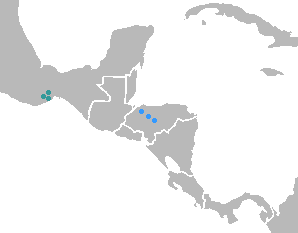Jicaquean languages
| Jicaquean | |
|---|---|
| Tolan | |
| Ethnicity | Tolupan |
| Geographic distribution | Honduras |
| Linguistic classification | Hokan ?
|
| Subdivisions | |
| Glottolog | jica1245[1] |
 The Jicaque languages are in Honduras in the center of the map | |
Jicaquean, also known as Tolan, is a small language family of Honduras. There are two attested Jicaquean languages, Tol (Eastern Jicaque) and Western Jicaque (Holt 1999), which Campbell (1997) reports were about as distant as English and Swedish. Only Tol survives.
Classification[edit]
Prior to an influential paper by Greenberg and Swadesh in 1953[2] Tol (a.k.a. Eastern Jicaque) was thought to be a language isolate, i.e., there existed no knowledge as to its possible genetic affinities. They argued that Tol should be added to the Hokan stock, a large language stock, phylum or family, which was proposed by R. B. Dixon and Alfred D. Kroeber in 1913.[3] In 1977, David Oltrogge[4] proposed to link Tol to the extinct Subtiaba language of Nicaragua, and also to Chontal of Oaxaca, also known as Tequistlateco. This indirectly amounted to a mere sub-classification, since all of the three languages in question were part of the proposed Hokan stock. A couple of years later, Campbell and Oltrogge[5] published a reconstruction of Jicaquean phonemes, based on the available information on Western and Eastern Jicaque. In that same paper they expressed strong doubt in the Hokan affiliation of Tol and mild enthusiasm regarding the possible link to Chontal of Oaxaca, but stressed that much more information was needed to be able to say anything reasonable. More recently, Kaufman[6] has expressed his continuing support of the Hokan affiliation of Tol.
Granberry & Vescelius (2004) speculate that the extinct Ciguayo language of Hispaniola might have its most likely relatives in the Tolan languages.
References[edit]
- ^ Hammarström, Harald; Forkel, Robert; Haspelmath, Martin, eds. (2017). "Jicaquean". Glottolog 3.0. Jena, Germany: Max Planck Institute for the Science of Human History.
- ^ Greenberg, Joseph Harold, and Morris Swadesh. 1953 Jicaque as a Hokan Language. IJAL 19:3
- ^ Dixon, R. B., and Alfred L. Kroeber 1913 New Linguistic Families in California. American Anthropologist 15(4): 647–655.
- ^ Oltrogge, David Frederick 1977 Proto-Jicaque-Subtiaba-Tequistlateco: A Comparative Reconstruction. In Two Studies in Middle American Comparative Linguistics. Irvine Davis and Virgil Poulter, eds. [Dallas, TX]: Summer Institute of Linguistics.
- ^ Campbell, Lyle, and David Oltrogge 1980 Proto-Tol (Jicaque). International Journal of American Linguistics 46(3): 205–223.
- ^ Kaufman, Terrence 2006 Hokan Languages. In Concise Encyclopedia of Languages of the World. Elsevier.
- Campbell, Lyle. (1979). "Middle American languages." In L. Campbell & M. Mithun (Eds.), The languages of native America: Historical and comparative assessment (pp. 902–1000). Austin: University of Texas Press.
- Campbell, Lyle. (1997). American Indian Languages, The Historical Linguistics of Native America. Oxford Studies in Anthropological Linguistics. Oxford: Oxford UP.
- Campbell, Lyle, and David Oltrogge (1980). "Proto-Tol (Jicaque)." International Journal of American Linguistics, 46:205-223.
- Granberry, Julian, and Gary Vescelius (2004). Languages of the Pre-Columbian Antilles. Birmingham: University of Alabama Press.
- Greenberg, Joseph H., and Morris Swadesh (1953). "Jicaque as a Hokan Language." International Journal of American Linguistics 19: 216-222.
- Holt, Dennis. (1999). Tol (Jicaque). Languages of the World/Materials 170. Munich: LincomEuropa.
External links[edit]
| This indigenous languages of the Americas–related article is a stub. You can help Wikipedia by expanding it. |